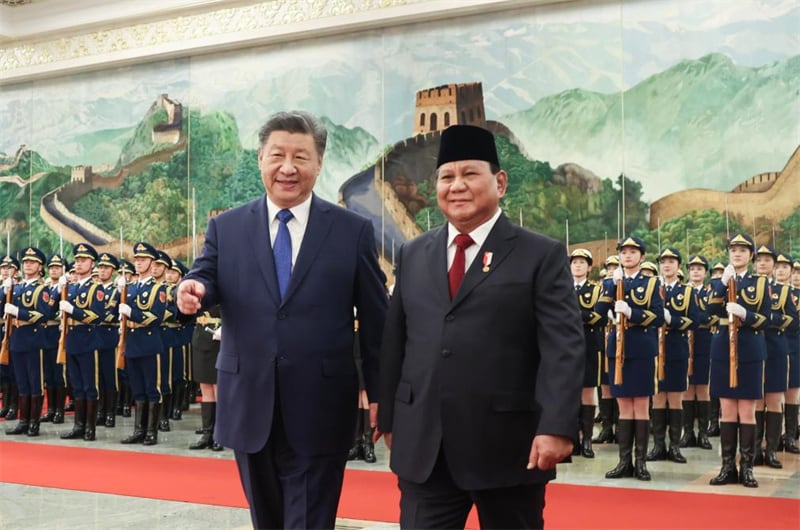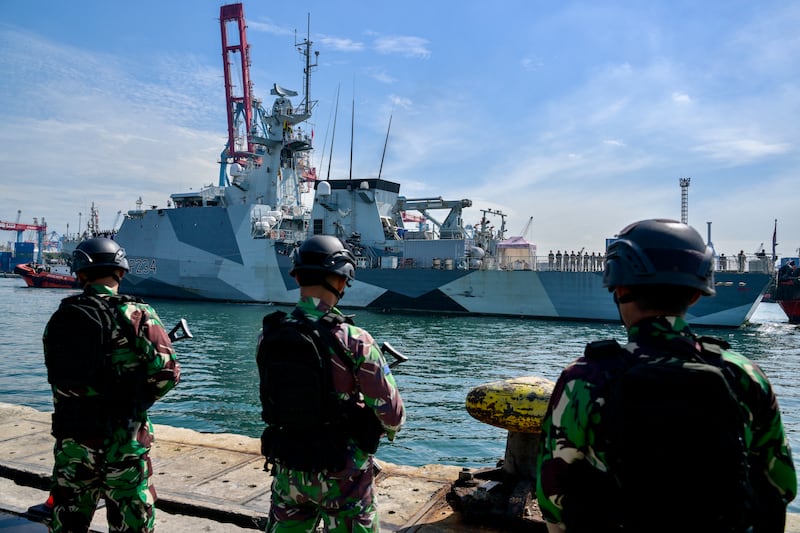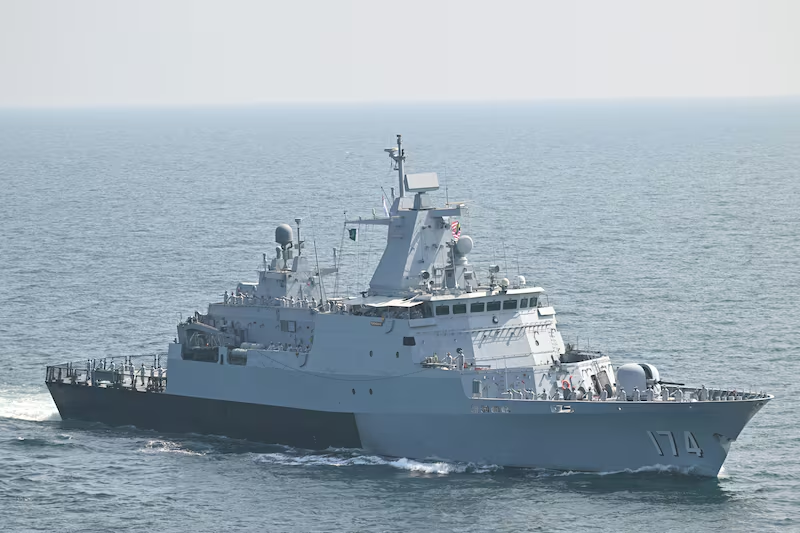Tensions between the Philippines and China in the South China Sea have been making more headlines in 2025 after escalating alarmingly last year.
Some other members of the Association of Southeast Asian Nations, or ASEAN, meanwhile, are trying to maintain good relations with their big neighbor to the north, whose economic and political influence is only growing in importance, while protecting their interests in the disputed waterway.
Reporters from RFA and BenarNews, an RFA-affiliated news organization, look at how three countries on the South China Sea are approaching relations with China.
INDONESIA: Growing openness toward China
In November 2024, Indonesia’s President Prabowo Subianto, stunned South China Sea watchers with a sentence in a joint statement issued in China on his first overseas trip since becoming president.

The seemingly innocuous line explained that Jakarta and Beijing had reached an “important common understanding on joint development in areas of overlapping claims” in the South China Sea.
But analysts were quick to point out that by acknowledging overlapping maritime boundaries, Prabowo and his officials had effectively acknowledged the legitimacy of China’s claims, something Indonesia had never done before.
Indonesia had always insisted that China’s so-called nine-dash line, which it uses on its maps to claim historic rights over most of the South China Sea, has no legal basis, as seen in a note verbale to the United Nations in May 2020.
Indonesia realized the mistake and issued a correction two days later, saying mutual recognition of differences and disputes does not equal accepting the other side’s legitimacy and China’s territorial claims in the South China Sea still lacked legal basis.
Muhammad Waffaa Kharisma, a researcher at the Centre for Strategic and International Studies, in Jakarta said that nevertheless, there has been “a shift toward a closer relationship that could reduce Jakarta’s assertiveness in the South China Sea under President Prabowo Subianto.”
China is Indonesia’s largest trading partner and one of its biggest sources of foreign direct investment, and expanding economic ties have been a major factor in Jakarta’s decision-making.
This year, Indonesia became the first Southeast Asia member of the BRICS bloc led by China.
Raden Mokhamad Luthfi, a defense analyst at Al Azhar University Indonesia said that there was growing openness toward China, not just in trade and investment but also in security cooperation.
Prabowo’s dominant role in foreign policy appears to have sidelined Indonesia’s ministry of foreign affairs, he said.
“I am concerned that under Prabowo’s leadership, Indonesian diplomats may have less space to provide input and guidance on how the country’s foreign policy should be shaped,” Luthfi said.
Waffaa noted a sense that “Indonesia is increasingly practicing self-censorship when dealing with China.”
“One possible explanation is China’s proactive diplomatic approach, which includes strong responses, or even retaliatory measures, against criticism,” he said. “This makes Indonesia more cautious, possibly fearing economic repercussions and as a result, it has become difficult to openly address concerns over sovereignty and international law.”
Indonesia is one of the founding members of ASEAN and long served as its de-facto leader, playing a crucial role in mediating regional crises. Analysts warned that its leadership in the group on the South China Sea issue would wane if it stopped championing international legal norms.

Indonesia has repeatedly said that it is not a party to territorial disputes in the South China Sea. But its law enforcement agencies have had to deal with encroachment and illegal fishing, including by Chinese vessels in the waters off the Natuna islands.
A major question now is whether warming relations will keep encroachments at bay.
MALAYSIA: Aligning with China’s preferences?
Malaysia’s leaders have always seen China as an important neighbor and partner with which they have to navigate a complex relationship.
The two countries established a comprehensive partnership in 2013 and China is Malaysia’s top economic partner, with trade worth more than US$200 billion in 2022. In comparison, Malaysia-U.S. trade was US$73 billion in the same year.
Since coming to power in 2022, Prime Minister Anwar Ibrahim has made it clear that fostering good ties with China is one of his priorities.
Regarding territorial disputes in the South China Sea, Malaysia’s long-standing policy has been to protect its sovereignty via international law. Malaysia has never recognized China’s nine-dash line and even ordered the removal of a scene from an animated movie that showed it.
Yet some of the prime minister’s comments have stirred controversy.
In March 2024, in a speech at the Australian National University in Canberra, Anwar said that countries needed to put themselves in China’s shoes and trying to block its economic and technological advancement would only bring grievances.
In November, after meeting President Xi Jinping in Beijing, Anwar said that Malaysia was “ready to negotiate” on the South China Sea, suggesting bilateral negotiations over conflicting claims in the waters off the coast of Sabah and Sarawak in East Malaysia.
At the World Economic Forum in Switzerland in January, once again the Malaysian leader stated that China should not be singled out for the tensions in the South China Sea, striking a clear pro-Beijing tone.
“Malaysia’s desire to exclude other countries, such as Australia, Japan and the United States, from South China Sea disputes aligns with China’s preferences,” wrote Euan Graham, a senior analyst at the Australian Strategic Policy Institute.
“It also helps China’s behind-the-scenes efforts to influence negotiations with ASEAN on a code of conduct for the South China Sea,” Graham added.
China and ASEAN have been discussing the Code of Conduct for the South China Sea for years but have yet to reach a final agreement.
In February, during a trip to Brunei, Anwar called for the code to be completed “as soon as possible” to address escalating tensions in the waterway. Malaysia is the ASEAN chair this year.
“I believe Malaysia prefers to settle the issue among the stakeholders through dialogue and engagement without any intervention from outside,” said Lee Pei May, assistant professor in the Department of Political Science at the International Islamic University Malaysia.
“If there is intervention from outside powers, I believe the situation would be chaotic,” Lee said. “The U.S., U.K. and other powers, they are not directly related to the dispute so they are considered outside powers.”
The U.S. and its regional allies, for their part, argue that they are also Pacific nations, and have interest in a free and open Indo-Pacific.

Some analysts said that the Anwar administration, despite being criticized for its seemingly pro-Beijing stance, had not compromised Malaysia’s claims in the South China Sea.
“To be sure, Malaysia has adopted a very different approach to the South China Sea dispute than either Vietnam or the Philippines,” said Ian Storey, a senior fellow at the ISEAS – Yusof Ishak Institute in Singapore.
Anwar’s policy still “allows Malaysia to maintain close ties with China while asserting its territorial claims and protecting its sovereign rights,” he said.
VIETNAM: A balancing act
On Feb. 19, Beijing for the first time officially and publicly denounced Vietnam’s island building in the South China Sea.
Foreign ministry spokesperson Guo Jiakun said that China opposed construction on “illegally occupied islands and reefs,” referring to the features that Vietnam began reclaiming in the 2020s.
It is not a secret that Vietnam wants to strengthen defenses against China’s dominance in the Spratly islands and the island building has received strong support from the Vietnamese public as the sign of a refusal to compromise on sovereignty.
“If you listen to leaders’ speeches on both sides, Vietnam-China relations appear to be warm and flourishing,” said Dinh Kim Phuc, a South China Sea researcher. “But Hanoi’s developments in the South China Sea show that they don’t really trust each other very much.”
With China’s first public protest against the island building, it seems that an “informal understanding” with Vietnam is over, noted Bill Hayton, an associate fellow at the British think tank Chatham House. This tacit compromise meant that for a few years Vietnam did not look for oil and gas inside China’s nine-dash line and China said nothing about Vietnam’s island building, Hayton said.
There may be several explanations for China’s objection but analysts believe Vietnam’s expanding ties with the United States is a major factor.
Looking at overseas trips by Vietnam’s leaders, including the new Communist Party chief To Lam, Vietnam also seems to “emphasize the values of ASEAN and the West” in its strategic thinking, according to Phuc.
Vietnam has been reported as wanting to elevate ties with fellow ASEAN members Indonesia and Singapore to comprehensive strategic partnerships, the highest level of bilateral relations, this year.
But that doesn’t mean that a decoupling from China would happen any time soon, analysts say, as Vietnam’s economy depends greatly on Chinese trade and investment.
On the same day that China criticized Vietnam’s “illegal occupation” in the South China Sea, Vietnam’s parliament approved a multi-billion-dollar railway running from the Chinese border to the South China Sea. Part of the funding is expected to come from China, despite some public unease about the potential debt.
Gestures by General Secretary To and other leaders that can be seen as “pro-West” or “anti-China” are deemed as “merely populist” by Dang Dinh Manh, a Vietnamese dissident lawyer now living in the U.S.
“They need to appease the general domestic public, which is increasingly nationalistic,” Manh said, adding that in his opinion the Hanoi leadership needed to appease China, too, and how to strike a balance can be “a serious task”, especially when it comes to sovereignty in the South China Sea.
Edited by Mike Firn
Pizaro Gozali Idrus in Jakarta and Iman Muttaqin Yusof in Kuala Lumpur contributed to this article.
BenarNews is an RFA-affiliated news organization.
